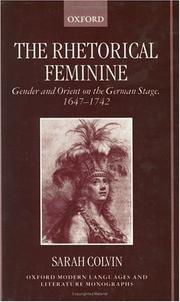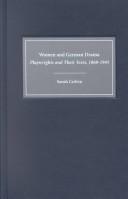| Listing 1 - 10 of 16 | << page >> |
Sort by
|

ISBN: 0198186363 Year: 1999 Volume: *8 Publisher: Oxford Clarendon Press
Abstract | Keywords | Export | Availability | Bookmark
 Loading...
Loading...Choose an application
- Reference Manager
- EndNote
- RefWorks (Direct export to RefWorks)
Theater --- Theater and society --- Women in the theater --- Théâtre --- Théâtre et société --- Femmes au théâtre --- Religious aspects. --- History --- Political aspects --- Aspect religieux --- Histoire --- Aspect politique --- Théâtre --- Théâtre et société --- Femmes au théâtre --- Germany --- 17th century --- German drama --- Early modern, 1500-1700 --- History and criticism --- Religious aspects
Book
ISBN: 9780415686860 9781315747040 9781317600138 9781317600145 9781317600152 9780815377573 Year: 2015 Publisher: London ;New York Routledge
Abstract | Keywords | Export | Availability | Bookmark
 Loading...
Loading...Choose an application
- Reference Manager
- EndNote
- RefWorks (Direct export to RefWorks)
Book
ISBN: 9781571134158 1571134158 9781571137517 9786612795619 1571137513 1282795619 Year: 2009 Publisher: Rochester, N.Y. Camden House
Abstract | Keywords | Export | Availability | Bookmark
 Loading...
Loading...Choose an application
- Reference Manager
- EndNote
- RefWorks (Direct export to RefWorks)
In 1970 Ulrike Meinhof abandoned a career as a political journalist to join the Red Army Faction; captured as a terrorist along with other members of the group in 1972, she died an unexplained death in a high-security prison in 1976. A charismatic spokesperson for the RAF, she has often come near to being idealized as a freedom fighter, despite her use of extreme violence. In an effort to understand how terrorism takes root, Sarah Colvin seeks a dispassionate view of Meinhof and a period when West Germany was declaring its own "war on terror." Ulrike Meinhof always remained a writer, and this book focuses on the role of language in her development and that of the RAF: how Meinhof came to justify violence to the point of murder, creating an identity for the RAF as resistance fighters in an imagined state of war that was reinforced by the state's adoption of what Andreas Musolff has called 'war terminology.' But its all-powerful identity as a fighting group eroded the RAF's empathy with other human beings - even those it once claimed to be 'fighting for.' It became a closed unit, self-justifying and immobilized by its own conviction that everything it did must be right. This is the first specialized study of Meinhof and the RAF in English - which is remarkable given the current interest in the topic in both Europe and the U.S. Sarah Colvin is Professor and Eudo C. Mason Chair of the German Department at the University of Edinburgh, UK.
Political violence. --- Terrorism in literature. --- Terrorism --- Terrorism. --- Women terrorists --- Women terrorists. --- History. --- Meinhof, Ulrike Marie. --- Rote-Armee-Fraktion. --- Germany (West). --- History --- Female offenders --- Terrorists --- Acts of terrorism --- Attacks, Terrorist --- Global terrorism --- International terrorism --- Political terrorism --- Terror attacks --- Terrorist acts --- Terrorist attacks --- World terrorism --- Direct action --- Insurgency --- Political crimes and offenses --- Subversive activities --- Political violence --- Terror --- Meinhof, Ulrike Marie --- Identity. --- Language. --- Ulrike Meinhof. --- Violence. --- West German Terrorism.

ISBN: 1281741388 9786611741389 1571136320 1571132740 Year: 2003 Publisher: Rochester, N.Y. : Camden House,
Abstract | Keywords | Export | Availability | Bookmark
 Loading...
Loading...Choose an application
- Reference Manager
- EndNote
- RefWorks (Direct export to RefWorks)
For women, according to the contemporary Austrian dramatist Elfriede Jelinek, writing for the theater is an act of transgression. The idea that drama as a grand public genre resists women writers has become established in recent scholarship. But Jelinek herself has won the Büchner Prize, the most prestigious award in German letters, and there is a wealth of dramatic work by women from the 20th century and before: both facts seem to contradict the notion of women's exclusion from drama. So why has drama by women appear to have been written against the odds, and why has it, until very recently, been missing from literary histories? This book looks in detail at women's playwriting in German between 1860 and 1945, and at its reception by critics. Many of the works considered have never before been analyzed by modern scholarship; others, notably the plays of Marieluise Fleisser and Else Lasker-Schüler, are well known, but are read here for the first time in the context of earlier dramatic work by women. Sarah Colvin seeks modes of reading that do justice both to the dramatic texts as 'performance' texts, and to the sense of 'otherness' experienced by the woman writer in a male-dominated literary and theatrical environment. She concludes that an understanding of the techniques developed by women playwrights of the nineteenth and early twentieth centuries can enrich our reading not only of Fleisser and Lasker, but of contemporary dramatists such as Jelinek. If all the world's a stage, playwrights can theoretically be seen as in control of the world they create; this book asks to what extent women dramatists manage to use the space of the drama to reflect the world that 'they' experience. Sarah Colvin is Reader in German at the University of Edinburgh.
German drama --- Women and literature --- German literature --- Women authors --- History and criticism. --- History --- Drama. --- Else Lasker-Schuler. --- Female dramatists. --- Feminism. --- Gender. --- German drama. --- German female author. --- German literature. --- Marieluise Fleisser. --- Play. --- Playwright. --- Sexism. --- Women dramatist. --- Women in literature. --- Women writers. --- Women's playwriting.
Book
Year: 2004 Publisher: Oxford: Blackwell,
Abstract | Keywords | Export | Availability | Bookmark
 Loading...
Loading...Choose an application
- Reference Manager
- EndNote
- RefWorks (Direct export to RefWorks)

ISBN: 9781571136329 9781571132741 Year: 2002 Publisher: Rochester, N.Y. Camden House
Abstract | Keywords | Export | Availability | Bookmark
 Loading...
Loading...Choose an application
- Reference Manager
- EndNote
- RefWorks (Direct export to RefWorks)
Book
Year: 2004 Publisher: Oxford Blackwell
Abstract | Keywords | Export | Availability | Bookmark
 Loading...
Loading...Choose an application
- Reference Manager
- EndNote
- RefWorks (Direct export to RefWorks)
Digital
ISBN: 9781571136329 Year: 2002 Publisher: Rochester, N.Y. Camden House
Abstract | Keywords | Export | Availability | Bookmark
 Loading...
Loading...Choose an application
- Reference Manager
- EndNote
- RefWorks (Direct export to RefWorks)
Literature --- German literature --- Germany
Digital
ISBN: 9781571137517 Year: 2009 Publisher: Rochester, N.Y. Camden House
Abstract | Keywords | Export | Availability | Bookmark
 Loading...
Loading...Choose an application
- Reference Manager
- EndNote
- RefWorks (Direct export to RefWorks)
Book
ISBN: 9781789146288 Year: 2022 Publisher: London : Reaktion Books, Limited,
Abstract | Keywords | Export | Availability | Bookmark
 Loading...
Loading...Choose an application
- Reference Manager
- EndNote
- RefWorks (Direct export to RefWorks)
As Nelson Mandela said, a nation should not be judged by how it treats its highest citizens, but its lowest ones. Shadowland tells the sometimes inspiring, often painful stories of Germanys prisoners, and thereby shines new light on Germany itself. The story begins at the end of the Second World War, in a defeated country on the edge of collapse, in which orphaned and lost children are forced into homelessness, scavenging and stealing to stay alive, often laying the foundations of a so-called criminal career. While East Germany developed detention facilities for its secret police, West Germany passed prison reform laws, which erected, in the words of a prisoner, little asbestos walls in Hell. Shadowland is Germany as seen through the lives, experiences, triumphs, and tragedies of its lowest citizens.
Prisons --- History, Modern --- Germany --- Social Science --- History
| Listing 1 - 10 of 16 | << page >> |
Sort by
|

 Search
Search Feedback
Feedback About UniCat
About UniCat  Help
Help News
News